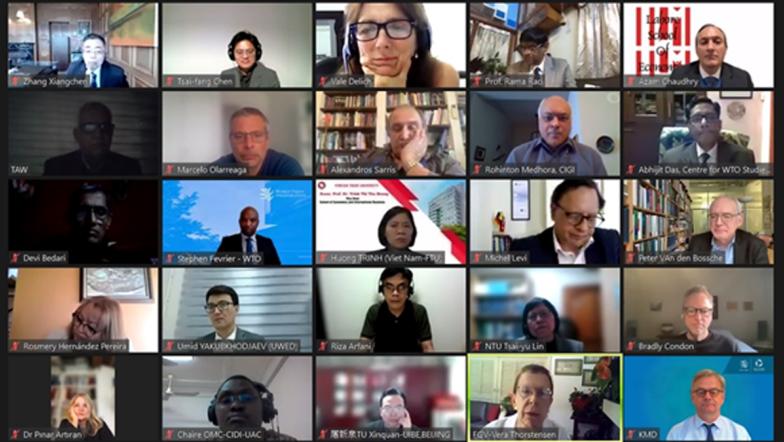WTO Chairs Programme discusses research plans, networking and needs of policy makers

Members of the WTO Chairs Network discussed research activities proposed for 2022 by the new members of the Chairs Programme at a meeting opened by Deputy Director-General Xiangchen Zhang on 17 February. DDG Zhang said: “I am looking forward to following the projects and activities of this next cycle of the Chairs Programme and seeing the new cohort of chairs provide their research and advice to governmental and other stakeholders. I also encourage them to establish links with WTO missions, with a view to contributing to ongoing WTO discussions.”
Speaking on behalf of Director-General Ngozi Okonjo-Iweala, Senior Advisor Stephen Fevrier encouraged the network of academic institutions to address the unprecedented challenges arising from COVID-19, climate change and digital advances and to help governments respond to these issues.
Mr Fevrier said the chairs that have just joined the programme take up their positions at a difficult time, when the international community is facing challenges it has never faced before. “Trade and trade governance are changing in the age of the pandemic, climate change and the accelerating digital evolution … I am confident that we will all successfully adapt to the reality in which we now share and work together in this network, and that together we will be able to deliver on the goals of this programme,” he said.
The 17 academic institutions who joined the WTO Chairs Programme (WCP) in December 2021 outlined their plans for their first year of activities. Many research topics were identified, including sustainable development and trade, trade and gender, e-commerce and the digital economy, economic resilience during the pandemic, trade facilitation, regional integration, migration and trade, global value chains, and trade and health.
The other 19 members of the Chairs Programme and a dozen Academic Advisory Board members will work with the 17 new chairs on how to deliver their plans in line with the goals of the Programme, which focuses on research, curriculum development and outreach to policy makers. The discussions will encourage collaboration between chairs of different stages of the programme by identifying areas of common interest and aligning the proposed research projects with the needs of governmental and other stakeholders in beneficiary members.
DDG Zhang emphasized the importance of collaboration: “For the WCP network to flourish, close interaction and collaboration of WTO chairs from previous phases with the new chairs is key. Last year's funded projects have yielded large amounts of high-quality outputs on many topical issues of interest to WTO members in capitals and in Geneva. To continue this momentum, we are also planning to make funding available for projects involving chairs of the first and second phases of the programme.” His full speech is available here.
Mr Fevrier said: “The pandemic not only impacts what you will research, teach and discuss, but also how. Ordinarily, we would all be gathering in person at the WTO. Hopefully, in the not-too-distant future this will be possible again and I look forward to welcoming you here and meeting you all in person.” His full speech is available here.
The WTO Chairs Programme aims to support trade-related academic activities by universities and research institutions in developing and least-developed countries. Fourteen institutions were selected as WTO Chairs for a four-year term in 2009. An additional seven institutions were selected for Phase 2 of the Programme in 2014. Phase 3 of the programme started with a selection process in December 2020, which resulted in 17 institutions being chosen to join the network of WCP Chairs. This further diversifies the Programme's representation across the globe, with the network now comprising 36 universities.




